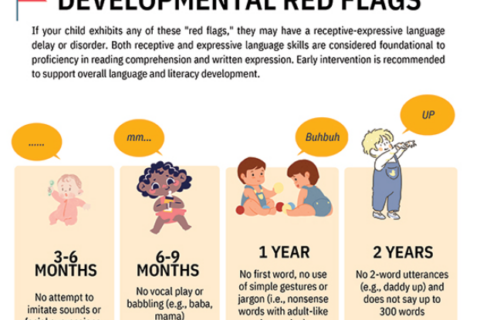9 Reasons Why Some Kids Need Speech Therapy
 Are you curious about why some children might benefit from speech therapy? Speech therapy supports children who may be experiencing delays or difficulties in various areas of learning. Since learning is a complex process that involves a range of interrelated skills—such as listening, thinking, remembering, understanding, speaking, problem-solving, organizing and more—speech therapy helps strengthen these abilities. By addressing speech and language challenges early on, children and teens can improve their communication, reading, writing, and social interactions, thereby helping students experience success across academic and social settings.
Are you curious about why some children might benefit from speech therapy? Speech therapy supports children who may be experiencing delays or difficulties in various areas of learning. Since learning is a complex process that involves a range of interrelated skills—such as listening, thinking, remembering, understanding, speaking, problem-solving, organizing and more—speech therapy helps strengthen these abilities. By addressing speech and language challenges early on, children and teens can improve their communication, reading, writing, and social interactions, thereby helping students experience success across academic and social settings.
Articulation
Speech sound or articulation delays or disorders occur when children struggle to produce sounds that are typically mastered by a certain age. This difficulty can result in reduced speech intelligibility and frustration when communicating.
Our articulation program adheres to the highest standards of evidence-based treatment techniques, utilizing multisensory approaches to help your child achieve their goals. We incorporate fun and engaging activities that align with principles of motor skill acquisition and motor learning theories. Following a hierarchy of skill progression moving from simple tasks and gradually progressing to more complex levels until mastery in conversation is achieved.
Language Development
When children experience challenges with understanding or expressing language, it is termed a receptive-expressive language delay or disorder. Both receptive (understanding) and expressive (speaking) language skills are fundamental for reading comprehension and written expression. Early intervention is crucial to support overall language and literacy development.
Symptoms of receptive-expressive language disorders can vary. Children may struggle to comprehend spoken language, follow directions, identify objects when named, answer questions, or engage in conversation. For children aged 3 and younger, these delays may manifest as difficulty being understood by unfamiliar people or speaking less than their peers or siblings did at a similar age. Providing additional support early can help optimize language learning, strengthen skills, and foster proficiency in speech, language, and literacy.
For school-aged children, signs may include seeming inattentive during conversations, showing disinterest in storybooks read aloud, difficulty following verbal instructions, or relying on simple sentences and vague vocabulary when communicating. Children with expressive language delays may have a limited vocabulary, find it difficult to organize their ideas clearly to tell a story, and struggle to participate in conversations. Our goal is to support your child’s success in academic settings, enhance communication and social skills, reduce frustration related to language difficulties, and boost their confidence.
Executive Function
Executive function skills refer to a group of cognitive skills that help students focus attention, process information, and remember and retrieve details. These skills help children to organize, plan, reason, and interpret information. They form the bedrock upon which language, literacy, communication, and learning are developed.
This group of skills enable children to listen actively, efficiently process and understand spoken language, and interpret written texts. They also aid in organizing thoughts, connecting ideas, and communicating them clearly and logically. Additionally, cognitive skills support essential functions like initiating tasks, monitoring progress, managing emotions, and controlling impulses.
Children experiencing challenges in these areas may struggle to express their ideas efficiently and effectively without losing their train of thought. They may have a tendency to interrupt others in conversations or experience breakdowns in communication.
Our tailored executive function program strengthens underlying cognitive foundations that are crucial for robust language and social communication skills. This improvement helps students easily process and interpret information, communicate with greater ease and confidence, and employ strategies that support speaking, reading, and writing effectively.
Social Language
Navigating various social situations can be confusing and overwhelming for some children. They may want to connect and play with peers, family, or adults but struggle to know how or feel anxious about trying. Many children need assistance in understanding how to communicate and behave in different social contexts.
Social communication skills, also known as pragmatic language skills, encompass qualities like social cognition, listening, and speaking skills, processing written and verbal information, and using written expression. We enhance social participation and help children develop meaningful friendships by teaching them the rules of social communication.
Our approach combines explicit instruction with activities and games that simulate real-life situations, helping children better understand social concepts and verbal and non-verbal language cues. This approach also fosters greater self-awareness and communicative confidence by providing opportunities to practice these skills in various scenarios.
Reading and Writing
Children who struggle with age-appropriate literacy skills may find it challenging to excel academically or fully express their knowledge. Our reading and writing program focuses on strengthening those aspects of language that are necessary for building reading and writing skills. These can include optimizing strategies to efficiently decode words, comprehend written texts, and spell. It may also involve support with organizing and planning language to write sentences, paragraphs, essays, and stories. We specifically target phonological awareness, decoding, reading comprehension, encoding, and written expression, all of which underlie many important academic skills so students can enjoy the learning process with confidence.
Feeding and Swallowing
Some children face challenges related to feeding and swallowing, which can manifest in difficulties forming a proper suck/ swallow/ breath pattern, chewing food effectively, and managing the movement of food or liquid through the mouth and throat. The underlying cause of these issues are numerous and may relate to neuromuscular weakness, coordination challenges, sensory sensitivities, structural or anatomical differences, or medication side effects. In some instances they may coincide with genetic syndromes like Down syndrome, Cerebral Palsy, or complex medical conditions.
Our speech-language pathologists understand the significant impact of feeding difficulties and the emotional toll they can take on families. We are committed to improving your child’s feeding and swallowing skills with care and precision, helping your family achieve its goals as effectively as possible.
Public Speaking and Vocal Strength
Whether your child finds the idea of delivering a presentation, conversing with friends, or interviewing with prospective colleges exciting or daunting, public speaking is a skill we all need and strive to master. Your speech-language pathologist (SLP) will conduct a comprehensive evaluation to identify areas of strength and need, such as projection, breath support, pitch, tone, vocal quality, speech rate, and clarity, while also understanding your child’s unique goals.
Additionally, we address the negative beliefs and thought patterns that cause fear, anxiety, and stress related to speaking, enabling your child or teen to approach these situations with confidence in their communication abilities.
Stuttering
Stuttering is a speech disorder that often begins in early childhood, typically around the age of 3. It is characterized by repetitions of sounds, syllables, or words, as well as hesitations before speaking, prolongations of sounds, or interruptions in speech airflow or voice. The severity of stuttering can range from mild to moderate or severe. Many individuals who stutter also experience tension, struggle behaviors, and secondary mannerisms like blinking while speaking.
Our stuttering program for children aged 6 and younger helps children increase awareness of “smooth” vs. “bumpy speech” and develop greater control of fluent speech in the context of play and everyday conversational contexts. For children aged 7 and older, our program aims to enhance a child’s comfort and confidence in communication.
Our licensed clinicians, who are expertly trained in this area, work to improve your child’s motor-speech coordination through targeted exercises and techniques that promote self-awareness, mindfulness, and relaxation. These strategies foster more fluent speech and boost confidence during speaking situations.
LSVT LOUD® for Kids
Some children struggle with producing clear speech and sufficient volume due to neurogenic differences. This challenge is particularly common in those with conditions like dysarthria, cerebral palsy, Down syndrome, Prader-Willi syndrome, autism, and other neurological conditions that affect speech. These conditions can cause speech to sound slurred, robotic, choppy, quiet, very fast or slow, nasal, hoarse, or breathy.
These difficulties can lead to frustration, anxiety, and reduced confidence in communication, as it can be exhausting and difficult to speak and be understood. LSVT LOUD®, recognized internationally as the gold standard for treating respiratory-voice-speech disorders in individuals with Parkinson’s disease and other neurological conditions, has also demonstrated research-backed benefits in assisting children who struggle with speech difficulties. Because we are one of the only clinics in the world that is overseen by an LSVT LOUD® instructor, we are able to offer an unparalleled LSVT LOUD® for Kids program.
Speech Therapy at Open Lines®
At Open Lines®, we believe that lasting and meaningful transformation goes beyond simply addressing symptoms. Our approach is holistic, focusing on open and collaborative discussions to ensure everyone is aligned and motivated towards their speech therapy goals. Our aim is to help your child gain confidence and achieve results swiftly.
If your child is encountering challenges with communication, it’s time to choose Open Lines®. Contact us by calling 212-430-6800, emailing [email protected], or filling out our convenient contact form. Unlock your child’s potential with Open Lines® Speech and Communication in New York today!
Get in Touch With Open Lines®














